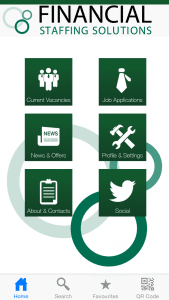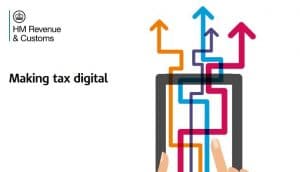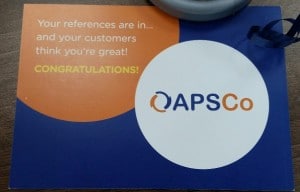28 Oct 2017
We’re Recruiting New Consultants
Financial Staffing Solutions are looking to grow their successful team of financial recruiters. Our state of the art office is located right by the Central Line.
A good deal of our clients are in based in and around London and Essex so we enjoy the dynamism of the capital, without the stress of the regular rush hour commute. Doesn’t that sound great?
So if you’re an experienced recruiter, ready to take a step up, earn a city salary locally and bring a new level of excellence to the business, contact us today.
We have a strong client base, excellent IT infrastructure and support together with opportunity to start making placements immediately.
We’re offering…
- An excellent package, with a competitive starting salary and benefits
- Uncapped commission
- Ongoing training and career development
- The opportunity to run your own team
To find out more about more about Financial Staffing Solutions and how you can make a positive career move, contact Paul Gladstone or email your cv to paul@staffingsolutions.co.uk
HMRC’s move to digital accounting is without doubt the biggest shake-up to the tax industry in a generation – yet many bookkeepers and most people who file tax returns remain unaware of the changes and what their implications are.
So how will making tax digital affect bookkeepers – and what do you need to tell your clients?
‘Making tax digital is effectively HMRC ensuring that tax accounting finally moves into the 21st century,’ says Brian Palmer, Tax Policy Adviser at AAT. ‘The clearest comparison is with online banking; it’s moving tax into an environment where you can see tax information in real time.’
The most significant element of the changes will be the introduction of quarterly reporting. ‘There are two aspects,’ says Palmer; making tax digital for individuals (MTDi) and making tax digital for businesses (MTDfB). ‘Essentially, the idea is for HMRC to be able to collate information from third parties electronically without, in the long run, taxpayers needing to do a tax return.’ HMRC’s aim is that by 2020 ‘people with straightforward incomes will only need to log onto their personal tax account and verify that HMRC have got the information they need.’
Future moves
That goal is still some time away, but for most businesses, the move to quarterly reporting is just around the corner – the rollout begins next April. Despite this timescale, there is still confusion about how extensive the changes will be. ‘Originally HMRC wanted everybody to capture and store all purchase and expense invoices digitally; but they have stepped back from that requirement and now are just asking for transactions to be recorded using the MTD-compliant software,’ Palmer explains. ‘If clients wish they will still be able to handle, issue and store paper documents. HMRC just requires that they do their bookkeeping electronically.’
The second question mark was over whether spreadsheets would still be allowed; ‘in fact they will still be acceptable, and as bookkeeper you will just need to link your spreadsheet data with HMRC’s systems using an MTD-compliant interface.’
Why are HMRC making these changes? The impetus is largely to do with wanting to address the tax gap (the amount of tax HMRC estimates goes uncollected), which is believed to be costing an astonishing £36bn a year. ‘£9.1bn of that is estimated to be due to error,’ Palmer says. Not fraud, he is at pains to point out; ‘simply mistakes by small businesses in their record keeping.’ HMRC believe that moving to quarterly reporting will ensure the data capture has more integrity, and this is hoped to reduce the tax gap by almost £1bn a year over time.
The bookkeeper’s view
For Jo McAllister, a bookkeeper with a range of self-employed clients and small businesses, there is a need for clarity from HMRC about what’s expected – and reassurance that micro-businesses and sole traders won’t be handed additional burdens in order to be compliant. ‘None of my clients do their records electronically; they use paperwork, I do the spreadsheets and we file once a year towards the deadline. I think there will be considerable anxiety around having to file quarterly,’ McAllister says. ‘We need to know if this will affect everyone, because for sole traders – hairdressers, cleaners, child minders – this will be quite a challenge.’ For McAllister, ‘there needs to be specific communication from HMRC, with plenty of warning. If it’s arriving next April, it’s hard for bookkeepers to instil confidence in their clients if they don’t know exactly what is required.’
The changes may present opportunities for bookkeepers, because small businesses who currently file their own accounts might decide that quarterly is too complex and instead will turn to a bookkeeper. But McAllister does not believe the move away from the January spike will especially help spread her work over the year. ‘Currently I’m very busy in December, January and February because people don’t have their records ready. To be doing that four times a year – that means more pressure because there are more deadlines. You have four crisis moments instead of one!’
There’s one final sting in the tail – quarterly reporting will actually mean five filings a year, not four. ‘To ease the need to have records kept up to date, quarterly returns will not have to be 100% accurate,’ Brian Palmer says. ‘Prepayments and accruals for example may not make their way into the data in time – so to take that into account there will be a fifth and final return 10 months after the end of the accounting period, to balance the books.’
Ultimately, will going digital make life harder for bookkeepers, or easier? ‘It will make it different,’ Jo McAllister says. ‘Again, we need clarity from HMRC about what kind of filing system they want us to use. Will I have to buy new software? In which case I’ll have to pass that cost on. If I do need new software, I need to be buying it sooner rather than later so I am familiar with it. But, I don’t want to commit to that if I don’t need to. Bookkeepers need to know for sure – and they need to know soon.’
Factfile: When will the changes come in?
- For self-employed, partnerships and unincorporated landlords with turnover above £85k: start on-boarding April 2018.
- For self-employed, partnerships and unincorporated landlords with turnover above £10k and lower than £85k: start on-boarding April 2019.
- Companies and complex partnerships (i.e. turnover above £10 million): start on-boarding April 2020.
- Those with turnovers below £10k will not be required to file quarterly tax returns until their year-to-date-turnover exceeds £10k.
- Clarification for VAT-registered businesses: it’s entirely possible that from April 2019 a VAT-registered business will be required to file MTD-compliant VAT returns, but not file quarterly their income and expenditure reports, as VAT reporting and tax reporting are separate.
Note 1: ‘On-boarding’ means ‘begin filing quarterly returns using MTD software. Your first quarterly filing may be later than these dates depending on your financial year end.
Note 2: The above is designed to be information that bookkeepers need to know, and pass on to their clients, and is accurate at the time of writing. More information from HMRC is likely to be forthcoming over the next few months.
Mark Blayney Stuart is Business Journalist of the Year, Wales Media Awards 2017 and Former Head of Research at the Chartered Institute of Marketing.
20 Apr 2016
“We’re Great!” The official line from APSCo, the trade body representing professional recruiters.
Financial Staffing Solutions has recently applied for membership to APSCo (The Association of Professional Staffing Companies) we were asked to provide references from clients and candidates in order to become a member. We were please to hear that our clients and candidates think we are doing a great job. This doesn’t mean that we are sitting on our laurels, we strive to provide a first class service. Well done to all the team. If your looking to recruit Accounting and Finance staff or seeking a new position, contact us to find out why people think we are great.
10 Nov 2015
We’re growing, recruiting new Consultants
You may already know that we have recruited further consultants to join our successful team in Loughton. In fact, we’re seeking TWO more people to come on board and give their careers a rocket launch.
Why Loughton? Being on the edge of the hustle and bustle means we have more quality time to interview candidates and build relationships with our vast client base. Our state of the art offices are located right by the central line, with fast and easy access into town. So one day we might be taking a leisurely drive through beautiful countryside to visit clients in the heart of Essex, and the next we’re whizzing up to Liverpool Street to provide our first class service to our clients there. Just 30 minutes door-to-door gives us valuable time to review CVs and match them to job specs.
A good deal of our clients are in docklands, the city and dotted around the west end, so we enjoy the dynamism of the capital when we visit, without the stress of the regular rush hour commute. Doesn’t that sound great?
So if you’re an experienced recruitment consultant ready to take a step up, earn a city salary locally and bring a new level of excellence to the business, call us today!
We’re offering…
- An excellent package, with a competitive starting salary and benefits
- Uncapped commission
- Ongoing training and career development
- The opportunity to run your own team
- Share option plan
Please send your CV to Alan Marcelis at Alan@staffingsolutions.co.uk, or call 020 8532 2644 to find out more.
15 Aug 2014
Guide to Annual Holiday Entitlement
Guide to Annual Holiday Entitlement.
Annual leave entitlements should be agreed when an employee starts work, details of holidays and holiday pay should be found in the employee’s written statement or contract of employment.
key points
• Most workers are legally entitled to 5.6 weeks paid holiday per year (this is known as statutory entitlement).
• Part time worker are entitled to the same amount of holiday (pro rota) as full time colleagues.
• Employers can set the times when workers can take their leave – for example a Christmas shut down.
• If employment ends workers have the right to be paid for any leave due but not taken.
• There is no legal right to paid public holidays.
•
Once an employee starts work details of holidays and holiday pay entitlement should be found in the employee’s written contract, where there is one, or a written statement of employment particulars given to employees by their employer.
Note: The written statement is required by law and must be given to employees by the employer no later than two months after the start of employment.
Additional annual leave may be agreed as part of a worker’s contract. A week of leave should allow workers to be away from work for a week – i.e. it should be the same amount of time as the working week. If a worker does a five-day week, he or she is entitled to 28 days leave. However, for a worker who works 6 days a week the statutory entitlement is capped at 28 days. If they work a three-day week, the entitlement is 16.8 days leave. Employers can set the times that workers take their leave, for example for a Christmas shut down. If a worker’s employment ends, they have a right to be paid for the leave due and not taken.
Public holidays
There is no legal right to paid leave for public holidays; any right to paid time off for these holidays depends on the terms of a worker’s contract. Paid public holidays can be counted as part of the statutory 5.6 weeks of holiday.
Carrying leave over from one leave year to the next
Workers must take at least four weeks statutory leave, they may be able to carry over the remaining leave if their employer agrees. Workers do not have an automatic right to carry leave over to the next holiday year.
This information was supplied by Acas
21 Jul 2014
Financial Staffing Solutions App

This App can be downloaded onto your iPhone, Tablet or Android phone. It’s packed with our latest jobs which you can apply for via the App. Latest market news and salary surveys and our must read blog. All of which you will be able to access anywhere you have an internet connection on your device.
You can download the App free of charge using the links or QR code below.
The App is completely free, download it and you can start look for new career opportunities.
The Financial Staffing Solutions app makes it easier for you to find your next accountancy or finance position. Developed especially for mobile or tablet platforms our “job push” function allows you to apply to a vacancy as soon as it goes live.
Financial Staffing Solutions is a leading finance & accountancy recruitment agency covering positions throughout London and the South East.
Our app will forward our latest jobs, give you the opportunity to upload your CV, track your application and get advice via our blog, tips and salary surveys all by the tap of a finger.
Specialising in Accountancy and Finance roles ranging from bookkeepers to qualified Finance Directors, we take pride in treating each applicant as an individual. Supporting the talented and ambitious with introductions to the very best career opportunities, as well as providing guidance and support throughout the selection process.
Offering unique job opportunities and providing advice, ranging from CV presentation to interview techniques, our approach ensures you have the best team behind you to help make that important career move.
We are always pleased to hear from people who looking for a new career opportunity.
26 May 2014
Meet Darren – our new recruit!
We’re delighted to welcome Darren Hymos to our head office team!
Darren joins us with a strong financial background – 28 years’ experience, mainly in corporate roles including both sales and management. So he’s perfectly placed to understand your financial recruitment needs.

Within a broad range of relevant qualifications, Darren holds various chartered business and finance diplomas from his corporate days. He’s highly skilled at helping businesses to reach their potential, and this is an area of his expertise that he’ll transfer to helping jobseekers achieve their dream roles.
Outside of office hours, Darren enjoys playing football, golf, squash and boxing – with several shiny trophies to boast about! He’s also a talented musician, gaining singing and trumpet awards from the Royal Academy of Music. And to top it off, he enjoys cooking! But don’t expect a three course meal when you call in for your interview – although you can expect to see a jar of jelly sweets on his desk if you visit our Chigwell office – he can’t resist them!
Darren’s a fantastic financial mind, a brilliant advisor and an exceptional father. What more could we ask of our new recruitment consultant?!

- How would you describe yourself?
Show your passion for your work. Describe yourself from a business perspective so the interviewer can feed off your enthusiasm. Focusing on your employment skills gives you the chance to show off the traits they’re looking for without taking it to a personal level. - How would your colleagues describe you?
This is especially good if you’re shy about blowing your own trumpet. You can raise the key points of honesty, efficiency and a hard working ethic without feeling embarrassed. - Why do you think you’ll fit into our company?
Having researched the firm, apply your strong personal skills to what you’ve learned about them.
Remember throughout that you need to build rapport with your interviewer. Demonstrating your enthusiasm for your work and the company will create a memorable bond that can score you interview points. Give tangible examples of your knowledge and/or experience, show that you’re genuinely interested in working there, and – very importantly – smile! We’re always happy to offer advice on interview skills – call us before the big day on 020 8532 2644
29 Apr 2014
A head start amongst candidates

This is your opportunity to show the interviewer how enthusiastic you are! Show them that you love the sound of the job, you’re interested in the company and you can’t wait to work there! Any potential employer wants to see how excited you are about the prospect of joining their firm. So give them what they want to see!!
The truth is, other candidates probably have similar financial skills and accounting experience to you – so you need to really set yourself apart. And a great way to do that is to gather as much knowledge about the firm as you possibly can.
Do your homework before the interview so that you’re really clued up. Then you can confidently demonstrate that you’ve researched the company – and the relevant department, if possible. Show an understanding of its strategy, structure, history and how it’s currently performing. Tell them how much you love their products or can relate to the services they offer.
Other candidates might not have bothered to prepare themselves well, so you can shine using your knowledge of what the company offers. And when asked what you can do that others can’t, you’ll be able to relate your financial skills and experience to the insightful company knowledge you’ve already gained.
Enthusiasm is contagious! If you can speak about the company with authority as well as showing that you really can’t wait to join, your passion will certainly impress them.
If you’re not sure how to relate your skills and experience to a new position, ask us about interview prep advice… Email info@staffingsolutions.co.uk.








